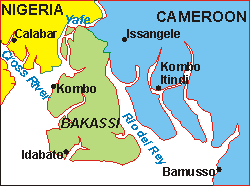|
afrol News, 13 October - The International Court of Justice (ICJ) has ruled on the border dispute between Nigeria and Cameroon, placing the main territory under dispute, the Bakassi Peninsula, under Cameroonian sovereignty. In defining the maritime boundary between the two states in the oil-rich Gulf of Guinea, the Court however essentially endorsed Nigeria's viewpoints. The Nigerian government has issued a short statement, saying it was "not possible or appropriate to talk in terms of 'winners' or 'losers'" after receiving the 150-pages verdict of The Hague-based international court. The Nigerian government would now "give the judgement careful study," said the Federal Minister of State (Justice), Alhaji Abdullahi Musa Elayo. The Cameroonian-Nigerian border case was reported to the ICJ by Cameroon in 1994, shortly after Nigeria's last military dictator, General Sani Abacha, had sent troops to the Bakassi Peninsula, a sparsely populated mangrove swamp. Nigeria was responding to increased Cameroonian gendarme pressure against local residents, most of which are claiming to be Nigerian citizens. Later the case was to include the maritime border between the two states, the entire border from the Gulf of Guinea to Lake Chad and in particular a Nigerian claim to the Darak area and the neighbouring villages at the shores of Lake Chad. Most interest however maintained in the Bakassi and maritime borders, where large-scale oil and gas production has been limited by the disputed sovereignty. According to an ICJ statement, the Court decided that, "pursuant to the Anglo-German Agreement of 11 March 1913, sovereignty over Bakassi lies with Cameroon." Similarly, the Court based its ruling on the northern Darak area on a 1931 French-British agreement, and it "rejected Nigeria's claims" of de facto sovereignty, non-regarding the Nigerian citizenship of most local residents. Nigeria, which last month had promised to respect the ICJ's verdict and "eventually demilitarising the Peninsula with the possibility of dispatching international observers to monitor troops pull-out," thus was ruled against in its main territorial claims. Solutions that "are favourable to Nigeria" (ICJ) were only adapted concerning minor sectors along the northern border (mostly in the Mandara Mountains).
Concerning the maritime border between Cameroon and Nigeria, however, the ICJ "essentially endorsed the delimitation method advocated by Nigeria." The border is to follow the "equidistance line" between the two countries. The Court further took special note of the case of the southern neighbour Equatorial Guinea when not fixing the tripoint between the three countries. According to Minister Elayo, therefore, "the judgement will have no effect on Nigeria's oil and gas reserves." The verdict seems to strengthen Nigeria's offshore oil industry by definitively placing the country's operative oil fields under its sovereignty. Further, the fixed boundary will encourage more drilling in the formerly disputed zone. Nigeria however has lost some oil and gas reserves hitherto claimed by the government. Nigerian companies were already sourcing crude oil from the disputed Bakassi Peninsula. Now, a more large-scale exploration and exploitation will be carried out by Cameroon, a country which has seen its oil reserves shrinking significantly over the last years. An even more important effect of the verdict is the commenced improvement of relations between the two neighbours, which were soured by the events in 1994. Cameroonian President Paul Biya and his Nigerian counterpart Olusegun Obasanjo met in Paris on 5 September, promising they would respect the ICJ verdict and "restore fraternal relations and good neighbourliness." Also Minister Elayo, commenting on the verdict that must have been disappointing to Nigeria, underlined the importance of restoring friendly relations. "The judgment will resolve many outstanding matters between the two states and provide a way forward for both, in areas which have caused difficulties in the past," concluded Mr Elayo. Sources: Based on ICJ, Nigerian govt and afrol archives
|
front page
| news
| countries
| archive
| currencies
| news alerts login
| about afrol News
| contact
| advertise
| español
©
afrol News.
Reproducing or buying afrol News' articles.
You can contact us at mail@afrol.com

